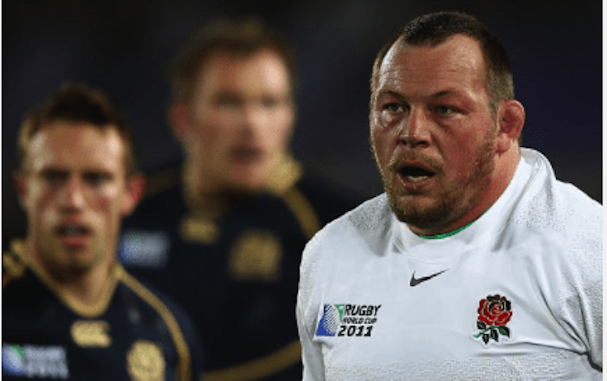Following reports that 70 former players are seeking to engage in group litigation against various national rugby bodies, former England international hooker Steve Thompson has spoken of his early-onset dementia diagnosis.
Thompson’s disease, he feels, is directly related to concussions suffered during his rugby career.
Speaking to the Guardian, Thompson’s harrowing testimony recounts a career that took everything from him and didn’t even leave him with memories.
‘I have no recollection of winning the World Cup in 2003, or of being in Australia for the tournament,’ Thompson said. ‘Knowing what I know now, I wish that I had never turned professional.’
Some days, Thompson says, he struggles to even remember his wife’s name.
‘I could look at Steph sometimes. And she says it’s like I’m a complete blank. And she’ll go: “I’m Steph.” The name’s gone. Gone.’
He is joined by ex-England flank Michael Lipman and former Wales No 8 Alix Popham as those named among eight test cases suffering dementia, all of whom are under the age of 45. Lipman told the Sydney Morning Herald that he had been knocked out a shocking 30 times in his career – a victim of a culture in which ‘if I wasn’t completely knocked out, I played on’.
After the sobering statements from Lipman, Thompson and Popham there is a prevailing sense that the dam wall is about to burst. ‘We believe we will be looking at an epidemic,’ one insider to the suit said. ‘We imagine there will be hundreds if not thousands of players once we go public.’
South African-born English lock Mauritz Botha is one of the players approached to participate in the group litigation. Botha who played over 140 times for Saracens and ten times internationally, retired from rugby in 2016 after multiple concussions.
Speaking on the controversy he said: ‘It seems silly that we had smartphones around 2012 and at a time when there were still no adequate concussion protocols in place. It was not properly managed.’
In the 1970s, the International Rugby Council, as World Rugby was formerly known, instituted a three-week stand-down period for players who suffered a concussion. This was changed to only one week in the 2000s.
Barry O’Driscoll, former medical commission member at the IRB, resigned in protest to the change. He claims there is ‘very little scientific basis for the seven-day rule other than it allowed players to return to play for next week’s game’.
World Rugby, in response to the latest reports, released a statement reading: ‘While not commenting on speculation, World Rugby takes player safety very seriously and implements injury prevention, management, education strategies based on the latest available knowledge, research and evidence.’





